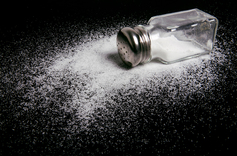 You may remember that in September 2011 well-known evangelical Pastor Perry Noble was caught up in a bit of a controversy. The controversy really had to do with ministry philosophy and practice. There was a dialogue between pastors in what was called "The Elephant Room" in one of the discussions Mr. Noble addressed with the others the differences between true worship and "strange fire." You can read more about the controversy by following the link provided below. During this time Chad took some time to consider Biblically the ramifications of a Christian leader who is leading in the wrong direction. In a post Chad posted on October 4, 2011 he addressed what he called "Saltless Leadership." "The recent Perry Noble controversy has touched off so much internet firestorm that it would be admittedly unhelpful for someone of my (limited) stature to weigh in on the debate. That said, I believe that it highlights a larger problem that I would like to address. The problem of saltless leadership. In Matthew 5, Following Christ’s well-known and much-loved “beatitudes,” he begins to instruct the gathered crowd regarding the obvious distinctiveness of a true Christ-follower. He does this by using the familiar salt and light analogies. He begins these analogies by authoritatively stating that true followers of Christ are, in fact, salt and light. Given the reality that Christ authoritatively states this claim, the responsibility naturally falls upon the Christ-follower to actively engage in the purposes usually regarded as the purposes of salt and light. Light shines in darkness, and the darkness is dispelled. Salt adds a distinct flavor to food, and is useful for purposes of preservation. Both are crucial to their surroundings, in that they are markedly different from the things that they impact, but they make distinctively positive differences. In a world without light, darkness (sin in this context) runs rampant. In a world with salt-less salt (the actual wording of the text), food tastes terrible, and temperamental food spoils. Believers, as salt and light, are called upon to make a distinct, positive difference in a sinful world as they follow Christ. The consequence of ignoring our calling is clear. Should we choose not to function as salt and light, we are useless for Christ’s service. Completely, utterly useless. We might as well be trampled under by the feet of men, or hidden under a basket. Christ closes his analogy with a plea in verse 16, “so let your light shine before man, so they might see your good works, and they might glorify your father, the One in heaven.” Pastor, I really don’t care if you’ve baptized thousands of people (Jack Hyles did that). It really doesn’t matter if yours is one of the fastest growing churches in America (Jack Hyles did that, too). It’s of no consequence that some evangelical leaders regard you as a peer (as they did with Jack Hyles). You can annunciate the terms of the gospel with the greatest of precision. You can write books that sell like hot-cakes. You can even hold up the example of the Reformers (who probably roll over in their graves every time you do), but let’s get clear on this - When you intentionally offend those whom you deem to be “more conservative than you,” when your worship services include music from the most wicked fringes of secular artistry, when your blog-post titles can’t be read in mixed company, and when you absolutely destroy the boundaries of authorial intent in order to eisegete (term used intentionally) your favorite book into a sick perversion of the biblical text, you betray the fact that yours is not the way of the cross. You are piece of salt-less salt, and you are utterly useless to the true cause of Christ. It’s time to drop the pragmatic evaluation of evangelical leadership (the one that made Jack Hyles so famous). It’s time for us to recognize, mark, and avoid saltless leadership." Posted by Caleb
0 Comments
Leave a Reply. |
AuthorsCaleb Phelps Archives
July 2021
|
 RSS Feed
RSS Feed